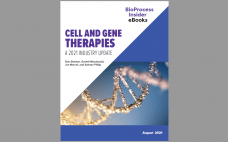Gene therapy quality depends on choosing the right analytical methods and technologies for each part of the production process says an expert from Biomarin. Lyndi Rice, head of the QC viral vector analytical group at Biomarin Pharmaceutical, told delegates at the BPI East conference in September: ‚ÄúAnalytics are really critical from the start of the manufacturing process and all the way to the end of product testing and monitoring. ‚ÄúRelease testing is critical for measuring product quality by assessing its…
Author Archives: Gareth Macdonald
Room for both allogeneic and autologous in cell therapy space
Allogeneic products may dominate the cell therapy sector thanks to tech and cost advantages but there will always be room for autologous treatments say experts. Cell therapies are either allogenic ‚Äď derived from a universal donor ‚Äď or patient-specific, autologous products. The products treat disease in the same way, what differs is the types of immune responses they generate and the process used to make them. And ‚Äď according to a panel of experts at the BPI East conference in…
How biopharma dealt with COVID: ‚ÄėWe science-ed the crap out of it!‚Äô
COVID-19 showed biopharma at its best and worst says a former regulator, who argues that the scrutiny which came with the pandemic highlighted some key industry challenges. The pandemic put biopharma in the spotlight according to Jeff Baker, former deputy director of the Office of Biotechnology Products in CDER, who told delegates at the BPI East hybrid conference last month the crisis highlighted industry‚Äôs strengths and weaknesses. ‚ÄúThere will be a lot of books written about the COVID-19 crisis and…
FDA: Drug firms using 24/7 production need more viral safety data
The US FDA has urged protein therapeutics makers using continuous manufacturing to take steps to keep products virus free. The regulator made the suggestion in a recent concept paper along with more general advice on how industry can use 24/7 production to manufacture protein drugs more efficiently. Viral contamination is an issue for all biopharmaceuticals made in processes that use mammalian cell lines. The cells contain sequences that can produce potentially harmful virus-like particles that must be removed from the…
eBook: Cell and Gene Therapies —
A 2021 Industry Update
The US Food and Drug Administration (FDA) reports that as of June 2021, 22 advanced therapy products have received regulatory approval in the United States. The first such product gained regulatory approval in 2010. Since then, hundreds of cell and gene therapies have advanced to clinical evaluation, but few products have reached commercial stages ‚ÄĒ and those that have done so have been hindered by manufacturing problems. In this eBook, writers from the BioProcess Insider and Project Farma analyze trends…
UK group says 3D printed automated control tech can cut mAb production costs
Automation provides a path to cheaper, faster monoclonal antibody (mAb) production says the UK consortium, which is using 3D printing to develop a tech-independent biomanufacturing control system. The consortium ‚Äď which includes BiologIC Technologies, Biopharm Services,¬†the UK Center for Process Innovation (CPI), Pall and¬†SCIEX ‚Äď announced the pact in July, explaining the plan is to develop a¬†prototype strategy and overlay it onto an existing, small scale mAb line. BiologIC Technologies‚Äô role is to use its 3D printing technology to develop…
Thermo: Cell & gene therapy key to further growth in 2021
Thermo Fisher Scientific says cell and gene therapy contracting, PPD and ongoing CAPEX investments will drive growth. The tech and services firm outlined its plans during a Q2 call, explaining its belief that the cell and gene therapy sector prompted its recent investment in a manufacturing center at the University of California San Francisco. CEO Mark Casper predicted the partnership would ‚Äúwill lead to new capabilities for our customers and ultimately better outcomes for patients.‚ÄĚ He added a desire to…
Ring raises $117m to fund development of anellovectors
‚ÄúVirome‚ÄĚ focused gene therapy vector firm Ring Therapeutics has raised $117 million in a funding round, attracting backing from venture capital funds and existing investors. The Cambridge, Massachusetts biotech announced completion of the series B fundraising round in July, explaining it will use the proceeds to further develop its range of vectors that are based on anelloviruses. CEO Tuyen Ong said. ‚ÄúWith this funding, and the partnership of an exceptional group of investors joining us on this exciting journey, we…
Thermo takes aim at growing plasmid DNA manufacturing market with new plant
Thermo Fisher Scientific has set out to capture a larger share of the growing DNA therapy and RNA vaccine market with a new facility in California. The facility ‚Äď a 67,000-square-foot facility located at¬†Thermo‚Äôs Carlsbad¬†campus ‚Äď will supply plasmid DNA for drug candidates in clinical trials as well as commercial supply. The firm cited growing global demand for plasmid DNA-based therapies and vital mRNA-based vaccines as the driver for the investment. CEO Marc Casper said, ‚ÄúDemand for commercial plasmid DNA…
Bluebird resumes Zynteglo sales after positive EMA committee review
Bluebird Bio has lifted the voluntary suspension on products containing its Zynteglo gene therapy after the EMA concluded the beta thalassemia therapy‚Äôs benefits outweigh its risks. The European Medicines Agency‚Äôs (EMA) Pharmacovigilance Risk Assessment Committee (PRAC) published its findings last week, concluding that there is ‚Äúno evidence‚Ä̬†Zynteglo¬†causes a blood cancer known as acute myeloid leukaemia (AML). The EMA wrote ‚ÄúThe¬†PRAC¬†reviewed two cases of AML in patients treated with an investigational medicine, bb1111 [also known as LentiGlobin] in a¬†clinical trial¬†for sickle…










